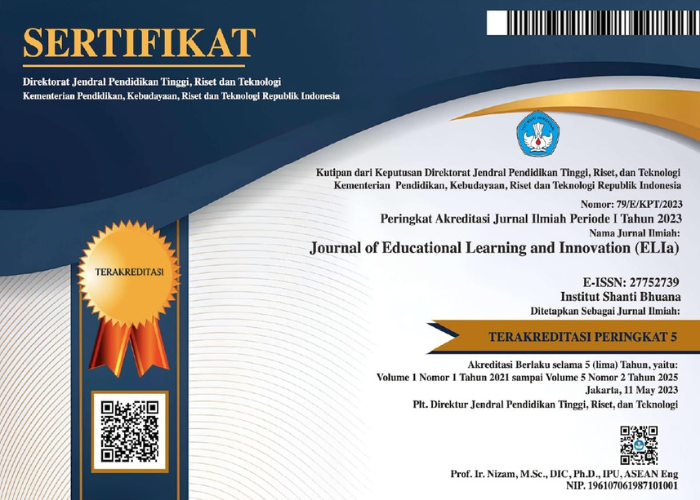PROBLEMATIKA PEMBELAJARAN DI ERA PANDEMI COVID-19
Abstract
Pemerintah China dan dunia selama masa pandemi COVID-19 memutuskan menutup sekolah secara nasional dan mengharuskan siswa untuk belajar online dari rumah. Artikel ini memiliki tujuan untuk menunjukkan problematika pembelajaran di era pandemi dan rekomendasinya. Studi literatur digunakan untuk mendeskripsikan berbagai problematika pembelajaran di era pandemi. Metode penelitian yang digunakan pada penelitian ini adalah kualitatif dengan pendekatan studi kepustakaan (library research) dengan cara mengumpulkan data dari berbagai sumber literatur. Proses pengumpulan data artikel melalui open access website Google Scholar dan Scopus dengan tahun terbit 2020 hingga 2022. Proses pencarian literatur dimulai frasa kunci utama “pandemi Covid 19”, “pendidikan” dan “sekolah”. Studi literatur menggunakan 29 artikel untuk mendeskripsikan berbagai problematika pembelajaran di era pandemi. Pencarian literatur selama pandemi di berbagai negara dilakukan sebagai pendukung paper. Problematika psikologis merupakan yang terbanyak sekitar 80% dan sisanya kesehatan fisik Saat sekolah sudah kembali dibuka, pemulihan harus dilakukan dengan cepat dan tepat dengan alokasi dana tepat guna. Disimpulkan bahwa sekolah harus membudayakan cuci tangan yang ketat sebelum dan setelah makan menggunakan sabun dan air. Perlu merancang kursus konseling kelompok untuk psikologi siswa terhadap trauma serta untuk meningkatkan ketahanan siswa selama masa pandemi. Model pembelajaran daring dapat digabungkan dengan pembelajaran luring sehingga akan mengatasi kekurangan masing-masing model pembelajaran pada saat sekolah sudah kembali dibuka.
References
Anugrahana, A. (2020). Hambatan, Solusi dan Harapan: Pembelajaran Daring Selama Masa Pandemi Covid-19 Oleh Guru Sekolah Dasar. Scholaria: Jurnal Pendidikan Dan Kebudayaan, 10(3), 282–289. https://doi.org/10.24246/j.js.2020.v10.i3.p282-289
Armocida, B., Formenti, B., Ussai, S., Palestra, F., & Missoni, E. (2020). The Italian health system and the COVID-19 challenge. The Lancet Public Health, 5(5), e253. https://doi.org/10.1016/S2468-2667(20)30074-8
Azubuike, O. B., Adegboye, O., & Quadri, H. (2021). Who gets to learn in a pandemic? Exploring the digital divide in remote learning during the COVID-19 pandemic in Nigeria. International Journal of Educational Research Open, 2(November 2020), 100022. https://doi.org/10.1016/j.ijedro.2020.100022.
Dimmera, B. G., Purnasari, P. D., & Sadewo, Y. D. (2022). PERSEPSI, KEBUTUHAN DAN TANTANGAN IMPLEMENTASI KEBIJAKAN “MERDEKA BELAJAR, KAMPUS MERDEKA” PADA PERGURUAN TINGGI SWASTA DI WILAYAH PERBATASAN. Sebatik, 26(2), 768-773.
du Plessis, A. E., & Sunde, E. (2017). The workplace experiences of beginning teachers in three countries: a message for initial teacher education from the field. Journal of Education for Teaching, 43(2), 132–150. https://doi.org/10.1080/02607476.2017.1286759
Fatwa, A. (2021). Pemanfaatan Teknologi Pendidikan Di Era New Normal. Jurnal Mahasiswa Teknologi Pendidikan, 1(2), 0–216.
Flasche, S., & Edmunds, W. J. (2021). The role of schools and school-aged children in SARS-CoV-2 transmission. The Lancet Infectious Diseases, 21(3), 298–299. https://doi.org/10.1016/S1473-3099(20)30927-0
Fujita, K., Inoue, A., Kuzuya, M., Uno, C., Huang, C. H., Umegaki, H., & Onishi, J. (2021). Mental Health Status of the Older Adults in Japan During the COVID-19 Pandemic. Journal of the American Medical Directors Association, 22(1), 220–221. https://doi.org/10.1016/j.jamda.2020.11.023
Greenhawt, M., Shaker, M., Stukus, D. R., Fleischer, D. M., Hourihane, J., Tang, M. L. K., Abrams, E. M., Wang, J., Bingemann, T. A., Chan, E. S., Lieberman, J., Sampson, H. A., Bock, S. A., Young, M. C., Waserman, S., & Mack, D. P. (2020). Managing Food Allergy in Schools During the COVID-19 Pandemic. Journal of Allergy and Clinical Immunology: In Practice, 8(9), 2845–2850. https://doi.org/10.1016/j.jaip.2020.07.016
Herlina, H., & Suherman, M. (2020). Potensi Pembelajaran Pendidikan Jasmani Olahraga Dan Kesehatan (Pjok) Di Tengah Pandemi Corona Virus Disease (Covid)-19 Di Sekolah Dasar. Tadulako Journal Sport Sciences And Physical Education, 8(1), 1–7. http://jurnal.untad.ac.id/jurnal/index.php/PJKR/article/view/16186
Hu, M., Chen, Z., Cui, H., Wang, T., Zhang, C., & Yun, K. (2021). Air pollution and critical air pollutant assessment during and after COVID-19 lockdowns: Evidence from pandemic hotspots in China, the Republic of Korea, Japan, and India. Atmospheric Pollution Research, 12(2), 316–329. https://doi.org/10.1016/j.apr.2020.11.013
Kahn, S. (2020). Hope for a Better Tomorrow: Three shifts defining 2021 and beyond. In Google APAC. https://www.thinkwithgoogle.com/intl/en-apac/consumer-insights/consumer-trends/hope-better-tomorrow-three-shifts-defining-2021-and-beyond/
Lima, E. S. (2020). Emergency Curriculum for Education During And After The Pandemic. Cadernos do CEPAOS.
Mok, K. H., Xiong, W., Ke, G., & Cheung, J. O. W. (2021). Impact of COVID-19 pandemic on international higher education and student mobility: Student perspectives from mainland China and Hong Kong. International Journal of Educational Research, 105(November 2020), 101718. https://doi.org/10.1016/j.ijer.2020.101718.
Pamungkas, N. Y. A., Suswandari, M., Fitrotiha, T. A. I., & Sapi’i, M. (2022). DAMPAK PEMBELAJARAN DARING TERHADAP HASIL BELAJAR SISWA SEKOLAH DASAR. Journal of Educational Learning and Innovation (ELIa), 2(2), 157-170.
Parady, G., Taniguchi, A., & Takami, K. (2020). Travel behavior changes during the COVID-19 pandemic in Japan: Analyzing the effects of risk perception and social influence on going-out self-restriction. Transportation Research Interdisciplinary Perspectives, 7, 100181. https://doi.org/10.1016/j.trip.2020.100181
Prem, K., Liu, Y., Russell, T. W., Kucharski, A. J., Eggo, R. M., Davies, N., Flasche, S., Clifford, S., Pearson, C. A. B., Munday, J. D., Abbott, S., Gibbs, H., Rosello, A., Quilty, B. J., Jombart, T., Sun, F., Diamond, C., Gimma, A., van Zandvoort, K., … Klepac, P. (2020). The effect of control strategies to reduce social mixing on outcomes of the COVID-19 epidemic in Wuhan, China: a modelling study. The Lancet Public Health, 5(5), e261–e270. https://doi.org/10.1016/S2468-2667(20)30073-6
Radwan, E., Radwan, A., & Radwan, W. (2020). The role of social media in spreading panic among primary and secondary school students during the COVID-19 pandemic: An online questionnaire study from the Gaza Strip, Palestine. Heliyon, 6(12), e05807. https://doi.org/10.1016/j.heliyon.2020.e05807
Remes-Troche, J. M., Valdovinos-Díaz, M. A., Viebig, R., Defilippi, C., Bustos-Fernández, L. M., Sole, L., & Hani-Amador, A. C. (2020). Recommendations for the reopening and activity resumption of the neurogastroenterology units in the face of the COVID-19 pandemic. Position of the Sociedad Latinoamericana de Neurogastroenterología. Revista de Gastroenterologia de Mexico, 85(4), 428–436. https://doi.org/10.1016/j.rgmx.2020.07.001.
Sadewo, Y. D., & Purnasari, P. D. (2021). Pengembangan Video Pembelajaran Matematika Berorientasi Kebudayaan Lokal pada Sekolah Dasar. Sebatik, 25(2), 590-597.
Sakamoto, M., Sasaki, D., Ono, Y., Makino, Y., & Kodama, E. N. (2020). Implementation of evacuation measures during natural disasters under conditions of the novel coronavirus (COVID-19) pandemic based on a review of previous responses to complex disasters in Japan. Progress in Disaster Science, 8, 100127. https://doi.org/10.1016/j.pdisas.2020.100127
Santosa, A. B. (2020). Potret Pendidikan di Tahun Pandemi: Dampak COVID-19 Terhadap Disparitas Pendidikan di Indonesia. CSIS Commentaries DMRU-079-ID.
Setyorini. (2020). PANDEMI COVID-19 DAN ONLINE LEARNING : APAKAH BERPENGARUH TERHADAP PROSES PEMBELAJARAN PADA KURUKULUM 13? Jiemar, 01(Juni), 95–102.
Shim, E., Tariq, A., Choi, W., Lee, Y., & Chowell, G. (2020). Transmission potential and severity of COVID-19 in South Korea. International Journal of Infectious Diseases, 93, 339–344. https://doi.org/10.1016/j.ijid.2020.03.031.
Silvester, S., Purnasari, P. D., Aurelly, B. T., & Gunawan, R. (2022). ANALISIS KEMAMPUAN GURU PENGGERAK PADA JENJANG SEKOLAH DASAR DI WILAYAH PERBATASAN DALAM PERSPEKTIF LITERASI TEKNOLOGI DIGITAL. Sebatik, 26(2), 412-419.
Sumanto, Y., & Sadewo, Y. D. (2021). Pelatihan pembuatan video pembelajaran sebagai media pembelajaran daring di sd negeri sojopuro dalam masa covid-19. Journal of Educational Learning and Innovation (ELIa), 1(1), 01-14.
Syah, R. H. (2020). Dampak Covid-19 pada Pendidikan di Indonesia: Sekolah, Keterampilan, dan Proses Pembelajaran. SALAM: Jurnal Sosial Dan Budaya Syar-I, 7(5). https://doi.org/10.15408/sjsbs.v7i5.15314
Viner, R. (2020). Pandemic school closures: risks and opportunities. The Lancet Child and Adolescent Health, 4(5), 341. https://doi.org/10.1016/S2352-4642(20)30105-X
WHO. (2020). The routes of transmission from COVID-19 patients. In World Health Organization (Vol. 73, Issue March, pp. 1–13). https://doi.org/10.1056/NEJMoa2001316.4.
Winurini, S. (2020). Permasalahan Kesehatan Mental Akibat Pandemi Covid-19. In Pusat Penelitian Badan Keahlian DPR RI.
Xue, Q., Xie, X., Liu, Q., Zhou, Y., Zhu, K., Wu, H., Wan, Z., Feng, Y., Meng, H., Zhang, J., Zuo, P., & Song, R. (2021). Knowledge, attitudes, and practices towards COVID-19 among primary school students in Hubei Province, China. Children and Youth Services Review, 120(November), 105735. https://doi.org/10.1016/j.childyouth.2020.105735
Yang, D., Swekwi, U., Tu, C. C., & Dai, X. (2020). Psychological effects of the COVID-19 pandemic on Wuhan’s high school students. Children and Youth Services Review, 119(November), 105634. https://doi.org/10.1016/j.childyouth.2020.105634
Zhu, B., Zheng, X., Liu, H., Li, J., & Wang, P. (2020). Analysis of spatiotemporal characteristics of big data on social media sentiment with COVID-19 epidemic topics. Chaos, Solitons and Fractals, 140, 110123. https://doi.org/10.1016/j.chaos.2020.110123
Ziauddeen, N., Woods-Townsend, K., Saxena, S., Gilbert, R., & Alwan, N. A. (2020). Schools and COVID-19: Reopening Pandora’s box? Public Health in Practice, 1, 100039. https://doi.org/10.1016/j.puhip.2020.100039
Copyright (c) 2023 Aditya Yoga Purnama, Ragil Saputri, Susanti

This work is licensed under a Creative Commons Attribution 4.0 International License.
Journal of Educational Learning and Innovation (ELIa)
Authors who publish with Journal of Educational Learning and Innovation (ELIa) agree to the following terms:
- Authors retain copyright and grant the journal right of first publication with the work simultaneously licensed under a Creative Commons Attribution License that allows others to share the work with an acknowledgement of the work's authorship and initial publication in this journal.
- Authors are able to enter into separate, additional contractual arrangements for the non-exclusive distribution of the journal's published version of the work (e.g., post it to an institutional repository or publish it in a book), with an acknowledgement of its initial publication in this journal.
- Authors are permitted and encouraged to post their work online (e.g., in institutional repositories or on their website) prior to and during the submission process, as it can lead to productive exchanges, as well as earlier and greater citation of published work (See The Effect of Open Access).













